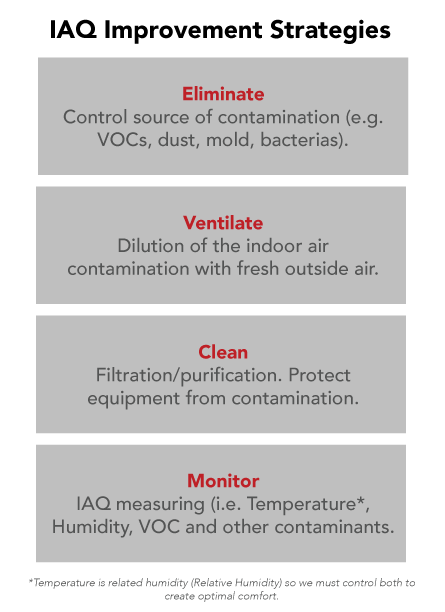Indoor Air Quality


La necesidad de mantener una óptima calidad de aire interior (CAI) en edificios comerciales está cobrando cada vez más importancia para asegurar la salud, satisfacción y productividad de las personas. Según lo determina ASHRAE, se considera que existe una Calidad de Aire Interior aceptable "en aquel aire que no contiene agentes anómalos en concentraciones nocivas y en el que más del 80 por ciento de los ocupantes no perciban inconformidad al respirarlo".
¿Por qué debemos preocuparnos por la Calidad del Aire?
- Las personas pasan hasta el 90% de su tiempo en espacios interiores (especialmente niños, ancianos, y enfermos crónicos).
- 50% de las enfermedades son causadas o empeoran por aire interior contaminado. *
- Una pobre calidad de aire puede causar o contribuir al desarrollo de enfermedades crónicas del sistema respiratorio**.
El apoyo de sistemas HVAC para mejorar la calidad del aire es una acción que se conoce desde hace ya mucho tiempo; no obstante, debe asegurarse el correcto diseño de los sistemas, pues si no ellos mismos pudieran representar una fuente de contaminación. Actualmente, el confort térmico ya no es el único objetivo que se debe buscar, se deben considerar el uso de energía, la calidad de aire interior y confort.
Consideraciones para los sistemas HVAC
- El equipo y la ductería tienen que ser dimensionados correctamente.
- La ductería tiene que estar bien sellada (sin fugas)
- El edificio debe disponer de buena ventilación.
- El contratista debe garantizar buen control de humedad.
- Cada espacio en el edificio debe estar balanceado.
- Asegurar buena filtración.
- Mantener los niveles de humedad relativa entre un 45% - 55%.
Lennox ofrece una amplia gama de productos innovadores para mejorar la calidad del aire Interior para aplicaciones comerciales y residenciales, como lo son nuestra línea Healthy Climate Solutions™ y la tecnología Lennox Humiditrol para deshumudificación. Además, los recuperadoras de energía Lennox incrementan la eficiencia del sistema y garantizan los valores óptimos de humedad.
Download Pdf Version